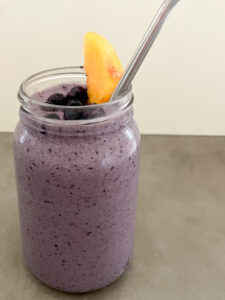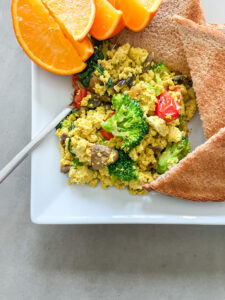Cold Oatmeal vs Cooked Oatmeal: What's Healthier?

With the popularity of overnight oats, many people wonder what is healthier, a cooked regular bowl of hot oatmeal or overnight oatmeal, which is typically served as cold oats or at room temperature. Cold oatmeal vs cooked oatmeal, that is the question! Both are a great option, but there may be some added health benefits to eating raw oats that have been soaked (overnight oats) as opposed to cooking them.
- Why are oats healthy for you?
- What are overnight oats?
- What are the health benefits of overnight oats (cold oatmeal vs cooked oatmeal)?
- What type of oats do you use for overnight oats?
- How do you make overnight oats?
- Basic Overnight Oats Recipe
- Do you eat overnight oats hot or cold?
- 10 Reasons to try overnight oats!
- More Healthy Breakfast Ideas from Each Healthy Bite
Why are oats healthy for you?
Oats, whether uncooked oats or cooked regular oatmeal are a super healthy breakfast option that offer a range of health benefits. Packed with fiber, they help keep your tummy happy and can make you feel full for longer. Plus, oats have special beta-glucans that are good for your heart, making them a tasty and smart choice for your morning meal.
In addition to being a filling and heart-friendly choice, oats come with extra perks. They're a great source of complex carbohydrates, providing steady energy, and they contain antioxidants that support overall health. Oats also offer essential minerals like iron, magnesium, and zinc, contributing to various bodily functions. Oats are known for helping to keep blood sugar levels under control.

What are overnight oats?
Overnight oats are a nutritious breakfast (and an easy breakfast!) that can be prepared the night before or even on Sunday night for the entire week. You mix oats with milk (low-fat milk or any plant-based milk), add your favorite flavors like fresh fruit, dried fruit, or nuts, and let it sit in the fridge overnight. The next morning, you've got a ready-to-eat, delicious, and no-cook oatmeal that's perfect for busy mornings!
What are the health benefits of overnight oats (cold oatmeal vs cooked oatmeal)?
Overnight oats come with an important added health bonus. The soaking process helps break down some compounds in oats, making nutrients more accessible for your body to absorb. In addition, overnight oats have a lower glycemic index than cooked oats, so they do not cause a rapid increase in blood sugar levels.
Cooking oatmeal does lead to some nutrient loss, but the impact is generally minimal. Oats are a nutrient-dense whole grain, and while heat exposure during cooking can cause a slight reduction in certain heat-sensitive nutrients the overall nutritional impact is modest. The primary nutrients in oats, including fiber, complex carbohydrates, and various minerals, remain largely intact during the cooking process.
Cold oatmeal vs cooked oatmeal, you decide! The choice is yours. While there are some health benefits to overnight oats, cooked oatmeal is also a super healthy breakfast option.
If having cooked oatmeal, try to preserve the maximum nutritional value. To do this avoid overcooking oats and choose cooking methods that use minimal water. For example, cooking oats with milk or a plant-based alternative can help retain nutrients better than boiling them in excess water. Adding nutrient-rich toppings or add-ins like fresh fruits, nuts, peanut butter, or chia seeds can further enhance the overall nutritional content of your oatmeal.

What type of oats do you use for overnight oats?
For overnight oats, you can use various types of oats based on your preference and desired texture. The most common choices include:
- Rolled Oats (Old-Fashioned Oats): These oats are flattened with large rollers, providing a hearty texture. They are a popular choice for overnight oats as they absorb liquids well and create a chewy consistency.
- Quick Oats: Quick cook oats (or instant oats) are rolled thinner than old-fashioned oats, making them quicker to cook. They are suitable for overnight oats if you prefer a softer or more creamy texture.
- Steel-Cut Oats: Steel cut oats are chopped into small pieces, offering a more robust and chewy texture. While they take longer to cook, you can still use them for overnight oats by allowing for a longer soaking time.
The choice of oats depends on your personal preference for texture and the time you have available. Experiment with different types to find the one that suits your taste and desired consistency for overnight oats. I would recommend getting organic oats whenever possible.
How do you make overnight oats?

Basic Overnight Oats Recipe
Equipment
- 1 mason jar or container that can be sealed
Ingredients
- ½ cup rolled oats old-fashioned oats
- ½ cup milk soy milk, unsweetened almond milk, other plant-based milk, or regular milk
- ½ cup yogurt Greek yogurt works well
- Sweetener of choice such as honey, maple syrup to taste
- Fresh fruits nuts, or seeds for topping
Instructions
- Combine Ingredients: In a mason jar or other container, mix rolled oats, milk, and yogurt. Stir well to ensure even distribution.
- Add Sweetener: If desired, add a sweetener of your choice, such as honey or maple syrup. (Skip the brown sugar as natural sweeteners will do the trick just fine.) Adjust the sweetness to suit your taste preferences.
- Mix and Seal: Stir the mixture thoroughly, ensuring oats are fully coated. Seal the jar or container with a lid.
- Refrigerate Overnight: Place the sealed jar or container in the refrigerator and let it soak overnight. This allows the oats to absorb the liquid and soften.
- Top Before Serving: In the morning, give the oats a good stir. Add your favorite toppings such as fresh fruits, nuts, dark chocolate chips or seeds.
- Enjoy: Your overnight oats are ready to eat! You can eat them cold or warm them up in the microwave if you prefer a warm breakfast.
Notes
Feel free to customize your overnight oats by experimenting with different toppings, flavorings, or using alternative milk and yogurt options. This basic overnight oats recipe can be a foundation for creating a delicious and nutritious breakfast tailored to your liking.

Do you eat overnight oats hot or cold?
Overnight oats are one of those breakfast favorites that can be enjoyed either hot or cold, depending on your preference. The oats absorb the liquid during the soaking process, resulting in a softened texture that's ready to eat.
Cold: This is a popular choice as many people enjoy overnight oats cold, straight from the refrigerator. This is a convenient and refreshing option, especially on warm mornings. You can add cold toppings like fresh fruits, nuts, or seeds before serving.
Hot: If you prefer a warmer breakfast, you can heat up your overnight oat mixture in the microwave or on the stove. Simply transfer the oats to a microwave-safe dish or heat them on the stovetop, stirring occasionally until they reach your desired temperature. This will make them more closely resemble a regular bowl of oatmeal.
Whether you choose to eat them cold or warm, the good news is that overnight oats offer a versatile and convenient breakfast option. Customize them with your favorite toppings and enjoy them the way that suits your taste and mood.
10 Reasons to try overnight oats!
- Convenience: Overnight oats are a time-saver, requiring minimal morning preparation. Just mix the ingredients the night before, and your breakfast is ready to grab and go without much time spent in the kitchen. Overnight oats are a perfect option for meal prep. I often prepare several jars of overnight oats on Sunday in preparation for the week ahead.
- No Cooking Required: Say goodbye to stove-top cooking or microwave waiting time. The oats soften during the overnight soaking process, eliminating the need for cooking. As I mentioned above, skipping the cooking process may actually add to the healthy benefits of oatmeal!
- Customizable: Overnight oats can be prepared in different ways to suit your taste preferences. You can experiment with various fruits, nuts, seeds, and sweeteners to create a breakfast that suits your liking. Popular choices for healthy toppings include: walnuts, flax seeds, pomegranate seeds, dark chocolate chips, chia seeds, cinnamon, and berries. Adding chia seeds, hemp hearts, almond butter, peanut butters, and other nuts and seeds can amp up the grams of protein in your breakfast.
- Nutrient Retention: The overnight soaking can lead to higher levels of nutrient absorption, ensuring you get the maximum benefits from the oats and other ingredients.
- Versatility: You can enjoy overnight oats either cold or warm (like the hot oats you may be used to), making them suitable for any weather, season or personal preference.
- Fiber Boost: Oats are rich in fiber, promoting digestive health and helping you stay fuller for longer. Overnight oats are an easy way to incorporate more fiber into your diet.
- Heart-Healthy: Oats contain beta-glucans, a type of soluble fiber known to support heart health by helping to lower cholesterol levels.
- Energy-Packed: With a good balance of complex carbohydrates, protein, and healthy fats, overnight oats provide sustained energy throughout the morning.
- Weight Management: The fiber content and filling nature of oats can aid in weight management or weight loss by reducing overall calorie intake and promoting a feeling of fullness.
- Budget-Friendly: Oats are an affordable pantry staple, making overnight oats the best way to have a cost-effective and nutritious breakfast option.
Trying overnight oats is not just about the convenience; it's a versatile and nutritious addition to your breakfast routine that can be tailored to your tastes and dietary preferences.
More Healthy Breakfast Ideas from Each Healthy Bite



